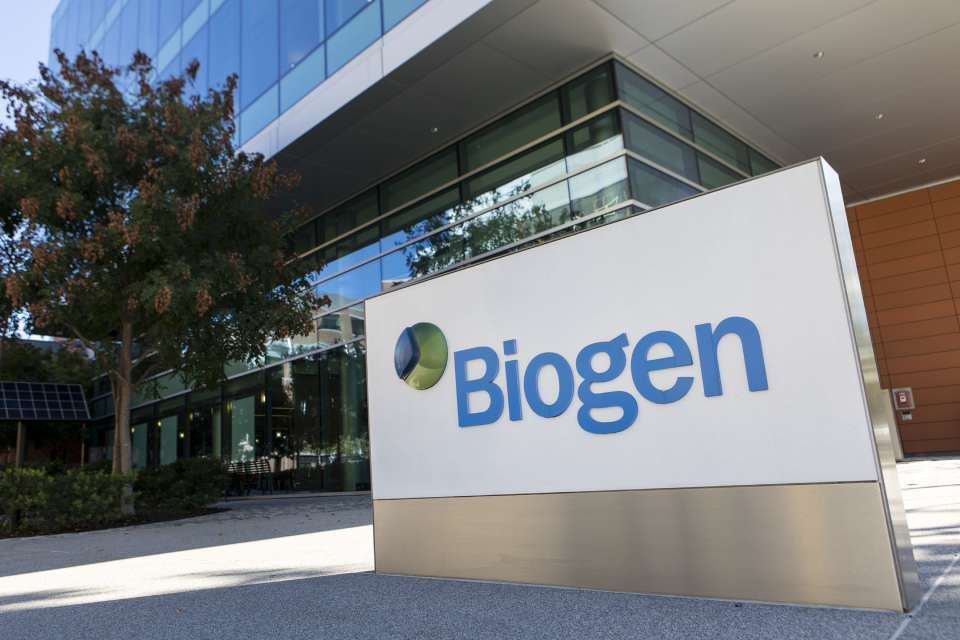Biogens Alzheimer’s drug shows more promising results. Shares of Biogen and other drugmakers investigating Alzheimer’s sickness took off early Wednesday after Japan’s Eisai Co. said its potential treatment seemed to slow the deadly sickness in a late-stage study.

The Biogen Inc., base camp is shown Walk 11, 2020, in Cambridge, Mass. Portions of Biogen and other drugmakers exploring Alzheimer’s illness took off early Wednesday, Sept. 28, 2022, after Japan’s Eisai Co. said its potential treatment seemed to slow the lethal illness’ advancement in a late-stage study. Eisai declared results late Tuesday from a worldwide investigation of almost 1,800 individuals with beginning phase Alzheimer’s.
Key Highlights:
l A few drug organizations are creating medicines for Alzheimer’s infection that target mind plaques, or amyloids.
l Eisai and Biogen declared results from a stage 3 clinical preliminary.
l The discoveries recommend that their treatment decreased the pace of mental degradation by 27% contrasted with a fake treatment bunch.
The drugmaker said early outcomes showed that its treatment, lecanemab, diminished patient clinical decay by 27% when contrasted with a fake treatment or phony medication following year and a half of the imbued treatment.
Eisai reported results late Tuesday from a worldwide investigation of almost 1,800 individuals with beginning phase Alzheimer’s.
Patients were observed utilizing a scale that actions cognitive deterioration and their capacity to do day to day exercises like getting dressed or taking care of oneself.
Eisai Co. Ltd. said it would examine full outcomes from the examination at a gathering in late November. It likewise plans to distribute discoveries in a friend explored clinical diary.
The organization is now looking for a sped up endorsement from the U.S. Food and Medication Organization, and the office is supposed to choose by right on time one year from now. Eisai and Biogen will co-advance the medication.
Specialists normally encourage alert in assessing a review until the full outcomes are delivered. In any case, the underlying discoveries give off an impression of being “very strong” and will probably uphold administrative endorsement, Mizuho Protections expert Graig Suvannavejh said in an exploration note.
An assertion from the Alzheimer’s Affiliation considered the discoveries the most uplifting to date for expected medicines of the fundamental sickness causes.
Approximately 6 million individuals in the U.S. furthermore, a lot more overall have Alzheimer’s, which step by step goes after region of the cerebrum required for memory, thinking, correspondence and fundamental everyday errands.
Alzheimer’s has no known fix. Well established medicines available simply oversee side effects, and scientists don’t completely comprehend what causes the illness.
Last year, Biogen’s Aduhelm turned into the main new Alzheimer’s medication presented in almost twenty years. However, it has to a great extent tumbled in the wake of appearing with a sticker price of $56,000 yearly, which Biogen later cut.
Specialists have been reluctant to recommend it, given powerless proof that the medication eases back the movement of Alzheimer’s. Guarantors have obstructed or confined inclusion because of worries over the medication’s excessive cost tag and unsure advantage.
Recently, the government Federal health insurance program forced severe cutoff points on who can get the medication, clearing out a large portion of its likely U.S. market. Biogen declared subsequently that it would stop the vast majority of its spending on the treatment.
Like Aduhelm, lecanemab, which Eisai created, means to clear a protein called beta-amyloid from the cerebrum.
The protein frames a plaque that specialists accept is a supporter of Alzheimer’s. They additionally highlight other potential variables like family ancestry and constant circumstances like diabetes.
Eisai chiefs say lecanemab zeros in additional on drifting clusters of the protein before it shapes the plaque, which is what Aduhelm targets.
Eli Lilly and Co. likewise is fostering an expected treatment, donanemab, that objectives the protein.
Portions of Cambridge, Massachusetts-based Biogen Inc. hopped 35% to $267.29 in Wednesday early daytime exchanging as the more extensive lists edged higher. The stock had generally tumbled since Aduhelm’s introduction last year.
Portions of Indianapolis-based Eli Lilly and Co. were up over 8%.
Alzheimer’s medication eased back mental degradation in clinical preliminary. In almost 1,800 members, a treatment from Eisai and Biogen eased back the pace of mental degradation by 27%.
Fundamental outcomes are in for a promising new medication to forestall mental deterioration among Alzheimer’s patients.
Lecanemab, created in a joint exertion by the Japanese organization Eisai and its American accomplice Biogen, eased back the pace of mental deterioration by 27% in a stage 3 clinical preliminary, as per a public statement, expanding the medication’s possibilities getting endorsed by right on time one year from now.
The preliminary included 1,795 members who had beginning phase Alzheimer’s illness. On an every other week premise, one gathering was regulated the medication intravenously and another gathering was given a fake treatment for quite some time.
The analysts saw “exceptionally measurably huge” easing back of disintegration contrasted with the fake treatment bunch. The discoveries restore trust for Alzheimer’s patients.
There were a few secondary effects for certain members; around 21% experienced cerebrum expanding or dying.
The declaration remains as a distinct difference to the rollout of one more Alzheimer’s medication from a similar organization, called Aduhelm. Both Aduhelm and lecanemab target mind plaque development, or amyloids. In any case, the information for Aduhelm was not persuading, bringing up issues about whether the medication really worked.
In spite of the absence of proof, Aduhelm got administrative endorsement.
Haruo Naito, the Chief of Eisai says in the public statement that these outcomes “demonstrate the amyloid speculation, where the strange amassing of [beta amyloid] in the mind is one of the primary drivers of Alzheimer’s illness.”
This clinical preliminary, while promising, isn’t an assurance that this medication will open up. Eisai had proactively applied for sped up endorsement from the Food and Medication Organization, the kind of endorsement given to Aduhelm.
“Preferably, we want to trust that information will be introduced or distributed in a friend checked on diary. Yet, the possibility of drawing nearer to tracking down medicines for Alzheimer’s Illness, regardless of whether that progress is gradual, is promising,” said doctor Riddhi Patira, an associate teacher of nervous system science at the College of Pittsburgh and a specialist at the school’s Alzheimer’s Sickness Exploration Center, to Changing America in an email.
The organizations have not yet set that information free from the preliminaries, which would likewise should be totally inspected by the U.S. Food and Medication Organization before endorsement.
A couple of different organizations are likewise creating comparative medicines that assault amyloids, including Roche and Eli Lilly.
“As trailblazers in neuroscience, we think that overcoming this illness will require various methodologies and therapy choices, and we anticipate proceeding with the conversation about the meaning of these discoveries with the patient, logical, and clinical networks,” Biogen’s Chief Michel Vounatsos said in the public statement.
Preliminary outcomes for lecanemab, a medication that objectives amyloid development in the mind, are a step in the right direction, yet it is hazy in the event that this treatment will really help those impacted by Alzheimer’s illness.
Preliminary outcomes for another medication to treat Alzheimer’s sickness have been depicted as a notable leap forward and an unequivocal win for those with the condition. Its designer, Japanese firm Eisai, has even said the outcomes “demonstrate” the speculation that the illness is brought about by a development of a protein called amyloid in the mind.
The outcomes positively are promising, also amazing, but rather it is extending things to paint them as an unequivocal win for patients, and the amyloid speculation hasn’t yet been certainly demonstrated.
For a really long time, it has been broadly held that Alzheimer’s sickness is brought about by amyloid development adding to the demise of synapses, prompting cognitive decline and disarray. Sadly, many medications that were intended to eliminate amyloid haven’t shown an advantage in preliminaries.
The new medication, called lecanemab, is a neutralizer that ties to amyloid, prompting it being cleared from the cerebrum by the safe framework. The most recent review looked at implantations of lecanemab given once like clockwork with a fake treatment in almost 1800 individuals with early Alzheimer’s sickness, in a randomized and dazed preliminary.
Individuals were surveyed for the seriousness of their side effects utilizing a battery of memory and other mental tests, as well as meetings with their guardians and specialists. Following year and a half, side effect scores for those given the genuine treatment had declined 27% not exactly those in the fake treatment bunch, as per a rundown of the outcomes posted web-based today.
This might sound great, yet the distinction in the scores between the two gatherings was little, merely 0.45 focuses on a 18-point scale. Beforehand, a few scientists in this space have assessed that to have a significant effect on individuals’ lives, any treatment would have to work on the score by somewhat more than that – by 0.5 to 1.0 places, says Robert Howard at College School London, who wasn’t engaged with the review.
It is conceivable that assuming individuals got the treatment for longer, the size of the impact would increment – yet this isn’t sure. Likewise conceivable aftereffects from lecanemab drove certain individuals to figure they had gotten the genuine medication, which would have upgraded any self-influenced consequence seen by them or their guardians, says Howard.
Provided that this is true, the medication would appear to be more successful than it truly is. We can’t know whether this occurred until the outcomes are distributed in full in a friend explored diary.
Another issue is that the medication caused the possibly serious symptoms of mind expanding and little drains in the cerebrum, seen on cerebrum filters. These happened in 21% of those given lecanemab and 9 percent of those given the fake treatment.
This level was “inside assumptions”, says Eisai. Yet, practically speaking, this could imply that individuals taking the treatment would require intermittent mind outputs to beware of wellbeing.
Eisai says it intends to apply for administrative endorsement for lecanemab in the US, Europe and Japan by Spring one year from now. In the UK, there would be a further obstacle: the treatment would possibly be presented through wellbeing administrations in the event that its advantages are determined to offset its expenses. This is in no way, shape or form sure for what could be a distinction in side effects so little that those impacted and their families wouldn’t see it.
Unsurprisingly, the symptoms of cerebrum enlarging and draining have likewise been seen with another amyloid-focusing on Alzheimer’s medication called aducanumab. This was supported for use in the US last year, however it was profoundly questionable, as preliminaries had neglected to show it caused an improvement in side effects, just that it helped clear amyloid.
Aducanumab causes mind enlarging and draining in 4 out of 10 beneficiaries. The most recent outcomes for lecanemab recommend that these side effects could be a run of the mill impact of amyloid-focusing on drugs.
Regardless of this multitude of provisos, the most recent outcomes – assuming they are borne out – would to be sure be a step in the right direction for Alzheimer’s exploration, as lecanemab is the very first illness changing Alzheimer’s treatment that emphatically affects side effects, regardless of whether it is a tiny one.
It is possible that, in future, a superior equilibrium between wanted impacts and secondary effects is accomplished by diminishing the measurements, involving the medication in mix with another medication or tweaking the component, says Howard.
The outcomes could accordingly sensibly be viewed as uplifting news for the people who research Alzheimer’s sickness – however not such a huge amount for the individuals who are impacted by it today.


